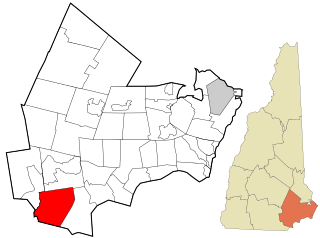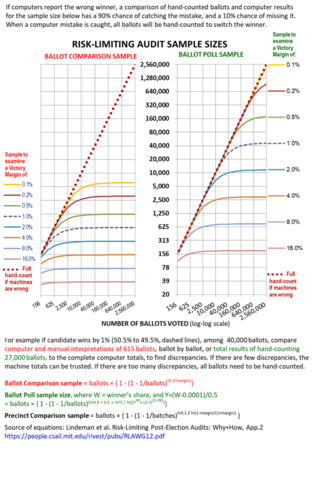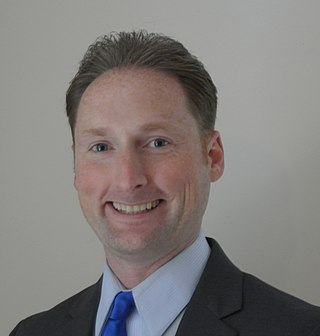Related Research Articles

Windham is a suburban town in Rockingham County, New Hampshire, United States. The population at the 2020 census was 15,817, up from 13,592 in 2010.
A voting machine is a machine used to record votes in an election without paper. The first voting machines were mechanical but it is increasingly more common to use electronic voting machines. Traditionally, a voting machine has been defined by its mechanism, and whether the system tallies votes at each voting location, or centrally. Voting machines should not be confused with tabulating machines, which count votes done by paper ballot.
Electronic voting is voting that uses electronic means to either aid or take care of casting and counting ballots.
Electoral fraud, sometimes referred to as election manipulation, voter fraud, or vote rigging, involves illegal interference with the process of an election, either by increasing the vote share of a favored candidate, depressing the vote share of rival candidates, or both. It differs from but often goes hand-in-hand with voter suppression. What exactly constitutes electoral fraud varies from country to country, though the goal is often election subversion.

The Help America Vote Act of 2002, or HAVA, is a United States federal law which passed in the House 357-48 and 92–2 in the Senate and was signed into law by President George W. Bush on October 29, 2002. The bill was drafted in reaction to the controversy surrounding the 2000 U.S. presidential election, when almost two million ballots were disqualified because they registered multiple votes or no votes when run through vote-counting machines.
Black box voting signifies voting on voting machines which do not disclose how they operate such as with closed source or proprietary operations. If a voting machine does not provide a tangible record of individual votes cast then it can be described as black box voting.
Vote counting is the process of counting votes in an election. It can be done manually or by machines. In the United States, the compilation of election returns and validation of the outcome that forms the basis of the official results is called canvassing.
Voter verifiable paper audit trail (VVPAT) or verified paper record (VPR) is a method of providing feedback to voters using a ballotless voting system. A VVPAT is intended as an independent verification system for voting machines designed to allow voters to verify that their vote was cast correctly, to detect possible election fraud or malfunction, and to provide a means to audit the stored electronic results. It contains the name of the candidate and symbol of the party/individual candidate. While it has gained in use in the United States compared with ballotless voting systems without it, it looks unlikely to overtake hand-marked ballots.
During the 2004 United States elections, concerns were raised about various aspects of the voting process, including whether voting had been made accessible to all those entitled to vote, whether ineligible voters were registered, whether voters were registered multiple times, and whether the votes cast had been correctly counted. More controversial was the charge that these issues might have affected the reported outcome of the presidential election, in which the incumbent, Republican President George W. Bush, defeated the Democratic challenger, Senator John Kerry. Despite the existing controversies, Kerry conceded the election the following day on November 3.
End-to-end auditable or end-to-end voter verifiable (E2E) systems are voting systems with stringent integrity properties and strong tamper resistance. E2E systems often employ cryptographic methods to craft receipts that allow voters to verify that their votes were counted as cast, without revealing which candidates were voted for. As such, these systems are sometimes referred to as receipt-based systems.
An optical scan voting system is an electronic voting system and uses an optical scanner to read marked paper ballots and tally the results.
The Voluntary Voting System Guidelines (VVSG) are guidelines adopted by the United States Election Assistance Commission (EAC) for the certification of voting systems. The National Institute of Standards and Technology's Technical Guidelines Development Committee (TGDC) drafts the VVSG and gives them to the EAC in draft form for their adoption.

A risk-limiting audit (RLA) is a post-election tabulation auditing procedure which can limit the risk that the reported outcome in an election contest is incorrect. It generally involves (1) storing voter-verified paper ballots securely until they can be checked, and (2) manually examining a statistical sample of the paper ballots until enough evidence is gathered to meet the risk limit.
California Association of Voting Officials (CAVO) is a non-profit organization that works with community members and voting officials to develop open source voting systems for use in public elections. In addition, CAVO provides training and education to election officials for the effective employment of open source voting technologies and management practices. Utilizing proprietary software and hardware, current voting systems have been reported as being riddled with shortcomings and "...affected by critical flaws" in testing, certification, accuracy, accessibility, and security, while exhibiting a lack of transparency and conflicts of interest. CAVO 's intent is to develop secure and transparent voting systems to ensure accurate vote counts coupled with the utmost in security by utilizing free open source software and commercial off-the-shelf (COTS) commodity components.

Albert "Max" Abramson is an American politician who most recently served as a member of the New Hampshire House of Representatives, representing Rockingham District 37 from 2018 to 2022. He previously represented the same district from 2014 to 2016. He ran for the nomination of the Libertarian Party for the 2020 presidential election, but dropped out on March 3, 2020.

An election audit is any review conducted after polls close for the purpose of determining whether the votes were counted accurately or whether proper procedures were followed, or both.
The Verified Voting Foundation is a non-governmental, nonpartisan organization founded in 2004 by David L. Dill, a computer scientist from Stanford University, focused on how technology impacts the administration of US elections. The organization's mission is to “strengthen democracy for all voters by promoting the responsible use of technology in elections.” Verified Voting works with election officials, elected leaders, and other policymakers who are responsible for managing local and state election systems to mitigate the risks associated with novel voting technologies.

Electronic voting in the United States involves several types of machines: touchscreens for voters to mark choices, scanners to read paper ballots, scanners to verify signatures on envelopes of absentee ballots, and web servers to display tallies to the public. Aside from voting, there are also computer systems to maintain voter registrations and display these electoral rolls to polling place staff.

The 2021 Maricopa County presidential ballot audit, commonly referred to as the Arizona audit, was an examination of ballots cast in Maricopa County during the 2020 United States presidential election in Arizona initiated by Republicans in the Arizona State Senate and executed by private firms. Begun in April 2021, the audit stirred controversy due to extensive previous efforts by Trump and his allies to overturn the election and due to assertions of rule violations and irregularities in the conduct of the recount, leading to claims that the audit was essentially a disinformation campaign. In June 2021, Maggie Haberman of The New York Times and Charles Cooke of National Review reported Trump had told associates that based on the results of the audit, he would be reinstated as president in August 2021.
An open-source voting system (OSVS), also known as open-source voting, is a voting system that uses open-source software that is completely transparent in its design in order to be checked by anyone for bugs or issues. Free and open-source systems can be adapted and used by others without paying licensing fees, improving the odds they achieve the scale usually needed for long-term success. The development of open-source voting technology has shown a small but steady trend towards increased adoption since the first system was put into practice in Choctaw County, Mississippi in 2019.
References
- 1 2 3 Han, Jeongyoon (November 8, 2022). "3 N.H. towns are testing out new ballot counting machines that use open source software". WBUR . Retrieved 2022-11-25.
- 1 2 3 O'Neill, Patrick Howell (December 16, 2020). "The key to future election security starts with a roll of the dice". MIT Technology Review . Retrieved 2022-12-09.
- 1 2 3 Wofford, Ben (June 25, 2021). "One Man's Quest to Break Open the Secretive World of American Voting Machines". Politico .
- 1 2 Huseman, Jessica (November 12, 2019). "The Way America Votes Is Broken. In One Rural County, a Nonprofit Showed a Way Forward". ProPublica . Retrieved 2022-12-09.
- ↑ Elder, Jeff (November 14, 2021). "How one company came to control San Francisco's elections". San Francisco Examiner . Retrieved 2022-12-09.
- ↑ Brooks, David (2023-01-11). "State audit of open-source voting machine gives thumbs-up, mostly". Concord Monitor . Retrieved 2023-06-18.
- ↑ Han, Jeongyoon (2023-01-16). "NH Ballot Law Commission moves forward with assessing new counting machines". New Hampshire Public Radio. Retrieved 2023-06-18.
- 1 2 3 4 5 "Voting Equipment Database – VotingWorks VX Accessible Vote-by-Mail". Verified Voting Foundation . Retrieved 2022-12-09.
- 1 2 Corpuz, Mina (November 2, 2020). "Technology, advocacy groups help make voting accessible for people with disabilities". SouthCoastTODAY.com - The Standard Times. Retrieved 2022-12-09.
- 1 2 3 4 5 6 7 8 9 10 11 "VotingWorks FAQ". www.voting.works. Retrieved 2022-12-04.
- ↑ "Georgia Sec. of State chooses own race for election audit". 11Alive.com. November 10, 2022. Retrieved 2022-12-09.